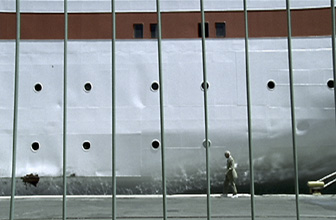|
Atlantic Drift
Michel Daëron
Österreich / Frankreich / Israel 2002
|
| |
|
 |
|
|
Delphi
11.02. 14.00
CinemaxX 3
12.02. 12.45
Arsenal 1
12.02. 19.30
Babylon
13.02. 16.00
|
|
|
|
|
Produktion: Extrafilm, Les Films d’lci
Kontakt: Extrafilm GmbH.
Große Neugasse 44/24, 1040 Wien
Tel.: (43-1) 58 17 896, Fax: 587 27 43
e-mail: extrafilm@chello.at
Buch: Michel Daëron
Kamera: George Diane
Ton: Joe Knauer
Musik: Jacques
Format: 35mm, 1:1.85, Farbe.
Länge: 90 Minuten, 25 Bilder/Sek.
Sprachen: deutsch, englisch, hebräisch |
|
|
|
|
Atlantic Drift beschreibt den zerplatzten Traum von 1880 jüdischen
Flüchtlingen, die dem nationalsozialistischen Europa erfolgreich
über die Donau entkommen waren, in der Hoffnung, in
Palästina von Bord gehen zu können. Nicht nur Krankheit,
Hunger und Tod stellten sich ihnen in den Weg, sondern auch
die britische Marine, die ihre Deportation nach Mauritius veranlasste.
Sie wurden nach dreimonatiger Irrfahrt an Bord der
‘Atlantic’, einem Schiffswrack, von den Briten in den Indischen
Ozean deportiert und fünf Jahre in einem napoleonischen
Gefängnis gefangen gehalten.
Michel Daëron: „Ruth Sander und ihrem Tagebuch habe ich viel
zu verdanken. Bei ihr habe ich außerdem die Skizzen von Fritz
Händel gefunden, ein Art Tagebuch in Bildern von der Zeit auf
der ‘Atlantic’... Mit an Bord nahm ich außerdem die Zeugenaussagen
und kilometerlange britische Mikrofilme, die ein
‘Gegentagebuch’ entwickelten, geschrieben von einer Administration,
die die Flüchtlinge über die Meere hetzte. Es ist
die Begegnung mit Schlomo, Fritz Händels Sohn, die der treibenden
‘Atlantic’ ein Ziel gibt. Wir begleiten seine Suche, teilen
sein Leid über das Nichtwissen und durchqueren die Grauzone,
die den Tod seines Vaters umgibt. Letzte Station der politischen,
moralischen, humanitären, historischen und psychologischen
Irrfahrten ist der Friedhof von Saint Martin, der auf den Indischen
Ozean blickt, so wie Schlomo – zusammen mit den
Nachkommen der zweiten Generation – auf seine Vergangenheit
schaut.“
|
| |
|
|
This is the story of the shattered dreams of
1.880 Jewish refugees who had managed to
escape Nazi Europe across the River Danube
in the hope of reaching Palestine. Disease,
hunger and death were not the only things
that stood between them and their goal. So
too did the British navy, which ordered
their deportation to Mauritius. After a
three-month odyssey across the Black Sea
and the Mediterranean on board the
“Atlantic“, a wreck of a ship, they were deported
to the Indian Ocean and imprisoned
in a Napoleonic prison for five years by the
British.
Michel Daëron: “I have Ruth Sander and her
diary to thank for throwing me a lifeline.
She also showed me sketches by Fritz
Handel, which form a sort of pictorial diary
of life on the “Atlantic”. Day after day I
studied the lines of his drawings and later
the pages of the manuscript in search of
forbidden signs. I used it like a daily dose
of amphetamine to bring the refugees’
memories back from the grave. But I could
not solve the mystery of Fritz Handel. The
“Atlantic” had finally set sail. On board
there was Ruth Sander’s diary, the eye witness
accounts and kilometres of British microfilm
that built up a “counter-diary“ written
by a bureaucracy that chased the
refugees across the oceans. An encounter
with Schlomo, Fritz Handel’s son, pointed
the drifting “Atlantic” towards its goal. We
accompanied his search, shared his suffering
about his ignorance and navigated the
fog shrouding his father’s death. The last
stop on this political, moral, humanitarian,
historical and psychological odyssey was at
the cemetery of Saint Martin looking out
over the Indian Ocean just as Schlomo and
the other second-generation descendants
look back on their past.“
|
| |
|
Biographien / Biographies
Michel Daëron, geb.1957 in Paris. Filme seit 1989 : Lune d’Avril
sur Canal A., Contre-jour de Siberie (1992), Moruroa, le grand secret (1993),
Les tondues de la libération. (1994), La Chaconne d’Auschwitz
(1999). Atlantic Drift
|
